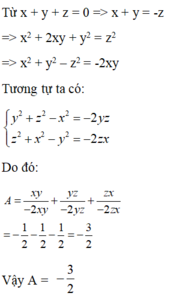
Hãy nhập câu hỏi của bạn vào đây, nếu là tài khoản VIP, bạn sẽ được ưu tiên trả lời.


Sửa đề: \(P=x^{2008}+y^{2009}+z^{2010}\)
Ta có: x+y+z=1
nên \(\left(x+y+z\right)^3=1\)
\(\Leftrightarrow x^3+y^3+z^3+3\left(x+y\right)\left(y+z\right)\left(x+z\right)=1\)
\(\Leftrightarrow3\left(x+y\right)\left(y+z\right)\left(z+x\right)+1=1\)
\(\Leftrightarrow3\left(x+y\right)\left(y+z\right)\left(x+z\right)=0\)
mà 3>0
nên \(\left(x+y\right)\left(y+z\right)\left(x+z\right)=0\)
\(\Leftrightarrow\left[{}\begin{matrix}x+y=0\\y+z=0\\x+z=0\end{matrix}\right.\Leftrightarrow\left[{}\begin{matrix}x=-y\\y=-z\\x=-z\end{matrix}\right.\)
Thay x=-y vào biểu thức \(x+y+z=1\), ta được:
\(-y+y+z=1\)
hay z=1
Thay x=-y và z=1 vào biểu thức \(x^2+y^2+z^2=1\), ta được:
\(\left(-y\right)^2+y^2+1=1\)
\(\Leftrightarrow y^2+y^2=0\)
\(\Leftrightarrow2y^2=0\)
hay y=0
Vì x=-y
và y=0
nên x=0
Thay x=0; y=0 và z=1 vào biểu thức \(P=x^{2008}+y^{2009}+z^{2010}\), ta được:
\(P=0^{2008}+0^{2009}+1^{2010}=1\)
Vậy: P=1
nma ở trên cm y=-z mà. Nếu ở thay y=0 và z=1 vào thì nghĩa là 0 = -1 hả

\(x+y+4=0\Rightarrow\left\{{}\begin{matrix}y=-4-x\\x+y=-4\end{matrix}\right.\)
\(x^3+y^3=\left(x+y\right)^3-3xy\left(x+y\right)=\left(-4\right)^3-3xy.\left(-4\right)=12xy-64\)
\(\Rightarrow P=2\left(12xy-64\right)+3\left(x^2+y^2\right)+10x\)
\(=24xy+3x^2+3y^2+10x-128\)
\(=24x\left(-4-x\right)+3x^2+3\left(-4-x\right)^2+10x-128\)
\(=-18x^2-62x-80=-18\left(x+\dfrac{31}{18}\right)^2-\dfrac{479}{18}\le-\dfrac{479}{18}\)
\(P_{max}=-\dfrac{479}{18}\) khi \(\left(x;y\right)=\left(-\dfrac{31}{18};-\dfrac{41}{18}\right)\)

\(a,A=x^2+y^2\\=x^2-2xy+y^2+2xy\\=(x-y)^2+2xy\\=2^2+2\cdot1\\=4+2\\=6\)
\(b,x+y=1\\\Leftrightarrow (x+y)^3=1^3\\\Leftrightarrow x^3+3x^2y+3xy^2+y^3=1\\\Leftrightarrow x^3+3xy(x+y)+y^3=1\\\Leftrightarrow x^3+3xy\cdot1+y^3=1\\\Rightarrow A=1\)
a) Ta có:
\(x-y=2\)
\(\Rightarrow\left(x-y\right)^2=2^2\)
\(\Rightarrow x^2-2xy+y^2=4\)
Mà: \(xy=1\)
\(\Rightarrow\left(x^2+y^2\right)-2\cdot1=4\)
\(\Rightarrow x^2+y^2=4+2\)
\(\Rightarrow x^2+y^2=6\)
b) Ta có:
\(x+y=1\)
\(\Rightarrow\left(x+y\right)^3=1^3\)
\(\Rightarrow x^3+3x^2y+3xy+y^3=1\)
\(\Rightarrow x^3+3xy\left(x+y\right)+y^3=1\)
Mà: x + y = 1
\(\Rightarrow x^3+3xy\cdot1+y^3=1\)
\(\Rightarrow x^3+3xy+y^3=1\)


B1
a, \(=>A=\left(x+y+x-y\right)\left(x+y-x+y\right)=2x.2y=4xy\)
b, \(=>B=\left[\left(x+y\right)-\left(x-y\right)\right]^2=\left[x+y-x+y\right]^2=\left[2y\right]^2=4y^2\)
c,\(\left(x^2+x+1\right)\left(x^2-x+1\right)\left(x^2-1\right)\)
\(=\)\(\left(x+1\right)\left(x^2-x+1\right)\left(x-1\right)\left(x^2+x+1\right)=\left(x^3+1^3\right)\left(x^3-1^3\right)=x^6-1\)
d, \(\left(a+b-c\right)^2+\left(a-b+c\right)^2-2\left(b-c\right)^2\)
\(=\left(a+b-c\right)^2-\left(b-c\right)^2+\left(a-b+c\right)^2-\left(b-c\right)^2\)
\(=\left(a+b-c+b-c\right)\left(a+b-c-b+c\right)\)
\(+\left(a-b+c+b-c\right)\left(a-b+c-b+c\right)\)
\(=a\left(a+2b-2c\right)+a\left(a-2b\right)\)
\(=a\left(a+2b-2c+a-2b\right)=a\left(2a-2c\right)=2a^2-2ac\)
B2:
\(\)\(x+y=3=>\left(x+y\right)^2=9=>x^2+2xy+y^2=9\)
\(=>xy=\dfrac{9-\left(x^2+y^2\right)}{2}=\dfrac{9-\left(17\right)}{2}=-4\)
\(=>x^3+y^3=\left(x+y\right)\left(x^2-xy+y^2\right)=3\left(17+4\right)=63\)
Bài 1:
a) Ta có: \(\left(x+y\right)^2-\left(x-y\right)^2\)
\(=x^2+2xy+y^2-x^2+2xy+y^2\)
=4xy
b) Ta có: \(\left(x+y\right)^2-2\left(x+y\right)\left(x-y\right)+\left(x-y\right)^2\)
\(=\left(x+y-x+y\right)^2\)
\(=\left(2y\right)^2=4y^2\)
c) Ta có: \(\left(x^2+x+1\right)\left(x^2-x+1\right)\left(x^2-1\right)\)
\(=\left(x-1\right)\left(x^2+x+1\right)\left(x+1\right)\left(x^2-x+1\right)\)
\(=\left(x^3-1\right)\left(x^3+1\right)\)
\(=x^6-1\)
d) Ta có: \(\left(a+b-c\right)^2+\left(a+b+c\right)^2-2\left(b-c\right)^2\)
\(=\left(a+b-c\right)^2-\left(b-c\right)^2+\left(a+b+c\right)^2-\left(b-c\right)^2\)
\(=\left(a+b-c-b+c\right)\left(a+b-c+b-c\right)+\left(a+b+c-b+c\right)\left(a+b+c+b-c\right)\)
\(=a\cdot\left(a+2b-2c\right)+\left(a+2c\right)\left(a-2b\right)\)
\(=a^2+2ab-2ac+a^2-2ab+2ac-4bc\)
\(=2a^2-4bc\)
